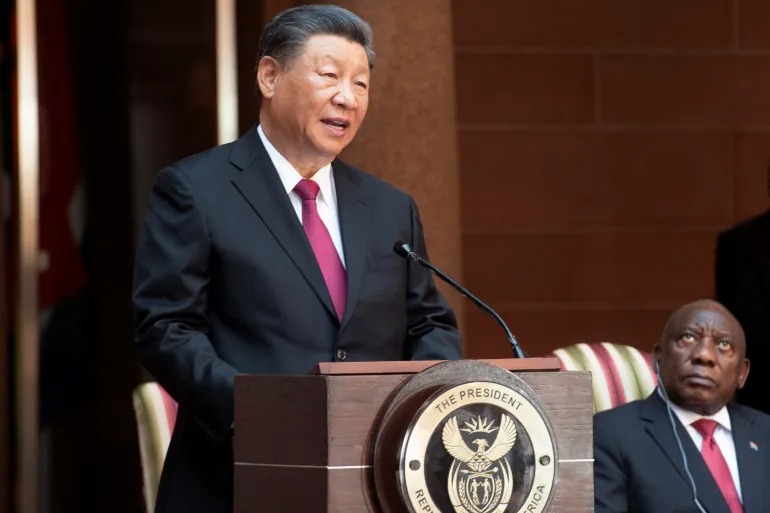Chinese President Xi Jinping has set forth a compelling proposition for the expansion of the BRICS alliance, an assembly of emerging economies. At the BRICS summit in Johannesburg, South Africa, Xi emphasized the imperative of constructing a more just and equitable international order, underscoring that “hegemonism is not in China’s DNA.” With his absence from the event, Xi’s speech echoed, resonating through discussions led by global leaders. This call for expansion, while celebrated by some, has illuminated differing viewpoints within the BRICS grouping and ignited dialogues on reshaping the global economic landscape.
China’s Call for BRICS Expansion:
President Xi Jinping’s call for the enlargement of the BRICS collective has reverberated through the summit’s proceedings. Standing on the side of history, China’s leader championed the pursuit of a just cause for the collective good. His remarks, articulated through Commerce Minister Wang Wentao, reiterated China’s aversion to great power competitions and bloc confrontations. As Xi avowed, BRICS must endure and grow, surmounting any obstacles that may arise, aligning with the changing world dynamics. This resolute stance from China opens the door for a new era of cooperation among emerging economies.
Diverse Views within BRICS on Expansion:
While Xi’s proposal garnered enthusiasm, the BRICS summit also brought to light varying perspectives within the alliance. Notably, Brazil and India exhibited more nuanced positions regarding the expansion of the bloc. Brazilian President Luiz Inacio Lula da Silva asserted that BRICS sought not to be a counterpoint to established international bodies but rather a mechanism for self-organization. India, similarly, showcased deliberation on the matter. This diversity of thought within BRICS underscores the complexity of global economic realignment and the challenges of forging a unified approach to expansion.
De-dollarization and Shaping a Multipolar Economy:
Beyond the discourse on expansion, the summit also delved into strategies to curtail dependency on the US dollar in international trade and financial transactions. Russian President Vladimir Putin, in his pre-recorded statement, championed the “irreversible” nature of de-dollarization within the BRICS economic sphere. This strategic move, designed to reduce vulnerability to Western sanctions, echoes the group’s aspiration to establish a multipolar economic landscape. With Russia’s economic struggles due to sanctions, the summit’s emphasis on de-dollarization underscores the bloc’s commitment to forging new economic trajectories.
In conclusion, President Xi Jinping’s fervent call for the expansion of BRICS has set the stage for renewed dialogue on global economic governance. Rejecting hegemonism and advocating for a more equitable international order, Xi’s words reverberated through the summit, prompting introspection and discourse among the member countries. As the alliance contemplates expansion, the divergent perspectives among its members highlight the intricacies of forging consensus. Additionally, the focus on de-dollarization underscores the alliance’s intent to reshape the global economic landscape, charting a course towards a multipolar world economy. The BRICS summit in Johannesburg, with its array of viewpoints and strategic discussions, has indeed proven to be a pivotal juncture in shaping the future of the global economy.















